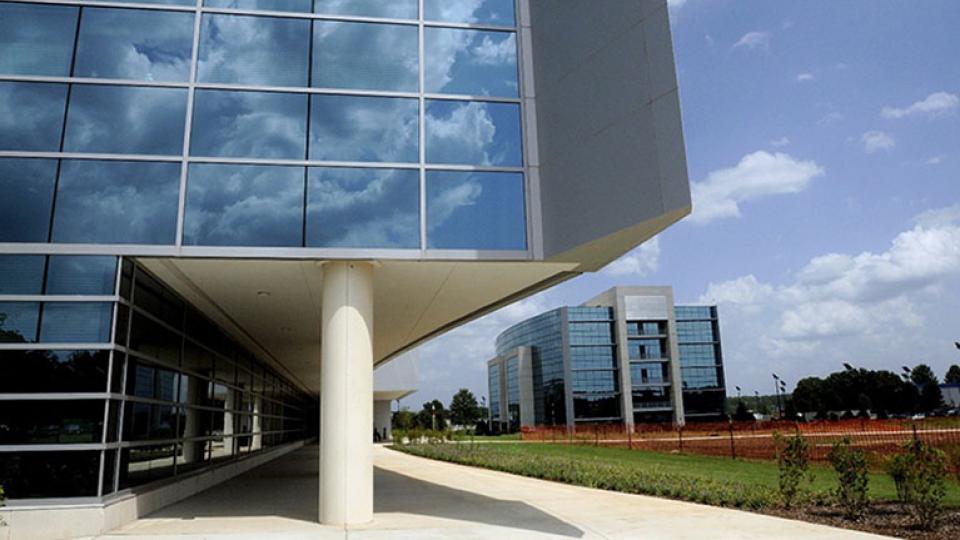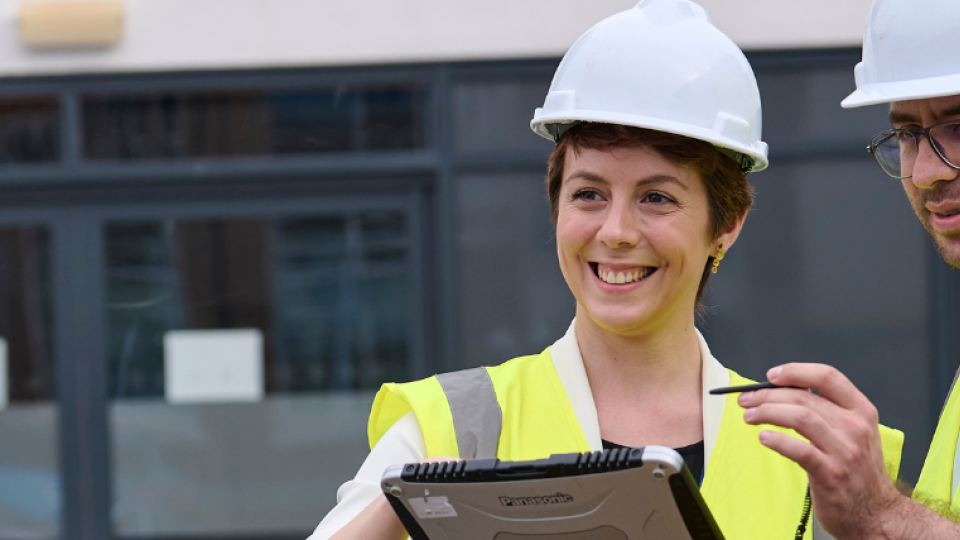
Sustainability in civil, structural and geotechnical engineering
Summary
This research group aims to develop high-quality research to find ways of reducing the impact of construction-related activities on the environment and to enhance the structural behaviour and durability of buildings.
About the group
The group’s research covers a wide range of applications and underpins our undergraduate and postgraduate courses. The research group hosts PhD students in a friendly and active research culture studying a variety of issues. This provides the basis for academics in the school to pursue research funding, develop research projects and build strong links and collaborate with industry partners.
The Group has established connections with the construction industry and benefits from highly qualified researchers, including professionally qualified civil, structural, highway, geotechnical and water engineers, architects and mathematicians.
Our research sets out to both create and increase knowledge in areas that include:
- structural modelling, analysis, design and experimental investigations
- sustainable materials
- structures and geotechnics
- environmental engineering and management
- sustainable urban Infrastructure
Group members
Group head:
-
Professor Ibrahim Shaaban
Professor of Structural EngineeringSchool of Computing and EngineeringIbrahim graduated from Ain Shams University, Egypt, in 1984. Since his graduation as a civil engineer, his career has progressed through three parallel paths, namely:
- academic (teaching and research)
- professional engineering
- education development and higher education policy and strategies.
He was awarded a PhD from the University of Dundee, UK, in 1993. Over the years he taught several courses related to design of concrete structures, structural analysis, properties of materials and concrete technology.
Group members:
-
Dr Muhammad Naveed
Associate Professor in Civil Engineering
-
Dr Spyridon Paschalis
Associate Professor in Civil Engineering
-
Dr Atiyeh Ardakanian
Lecturer in Hydraulics
-
Dr Efcharis Balodimou (Haroula)
Course Leader in Architectural Design Technology
-
Dr Reza Keihani
Lecturer in Building and Environmental Engineering
-
Dr Livia Lantini
Senior Lecturer in Civil Engineering
Contributory members:
Collaborators from different universities and research centres:
- The Faringdon Research Centre for Non-Destructive Testing and Remote Sensing
- Professor Joe Rizzuto (Kingston University)
- Professor Hanaa Elsayad (Benha University)
- Professor Paul Hallett (University of Aberdeen)
- Professor Mohamed Said (Benha University)
- Professor Tarek S. Mustafa (Benha University)
- Professor Sadaqat Ullah Khan (NED University)
- Dr Chin Siew Choo (Universiti Malaysia Pahang)
- Dr Amr El-Nemr (German University in Cairo)
- Dr Nancy Hammad (German University in Cairo)
- Dr Messaoud Saidani (Coventry University)
- Mathieu Lamandé (AARHUS University)
- Dr Bashar S Mohammed (Universiti Teknologi PETRONAS)
Research themes
The following is a list of current research themes with areas of interests to members of the research group.
-
Sustainable structures
- Design, modelling and testing of structures, including assessment methods in reinforced concrete, steel, timber, masonry and their composites
- Reciprocally supported elements (RSE) space structures structural behaviour including structural morphology, configuration processing
- Optimisation techniques, numerical modelling, bolted joint stiffness parametric investigation using finite element analysis and experimental investigations
- Masonry arches and vaults, modelling, rehabilitation and strengthening methods
- Behaviour and applications of cross-laminated timber in building structures using global and finite element analysis
- Shear behaviour of high strength concrete beams, including hybrid fibres
-
Geotechnics
- Advances in measuring mechanical properties of soils in relation to soil health
- Permanent and temporary support to excavated slopes using soil nails
- Roads deteriorate in the form of potholes: how can effective design and innovative materials could stop this?
- Bioengineering slope stabilisation: How root length density, root branching, and root strength contributes to soil reinforcement
- Soil stabilisation using biopolymers
- Soil-structure interaction
- Soil-sensors and geotechnical instrumentation
- Advances in the design of pile foundations
-
Civil and environmental infrastructure engineering
- Impact of smart technologies on the improvement of sustainability based performance in urban water systems
- Sustainability and resilience-based performance assessment of urban water infrastructure
- Intelligent monitoring and flood prediction for real-time control of combined sewer systems with rainfall radar data
- Planning of urban water systems for climate change adaption using metabolism based modelling
-
Sustainable materials
- Sustainable construction materials
- Volume stability and strength development of concrete made with recycled glass aggregates
- Structural behaviour of high strength concrete in adverse conditions
- Bacterial self-healing of cracks in concrete
-
Built environment design and construction
- Applications of sustainable building design with Building Information Modelling (BIM) in the design, construction and planning process
- Extending the useful life of structures
- 3D virtual reality visualisation in structural and architectural design
- Sustainable urban development
- Renewable energy and its applications in the built environment
- Sustainable conservation, refurbishment and adaption of buildings
-
Applied mathematics and statistics
- Optimisation applications to civil and structural engineering
- Vibration and excitation of structural systems
- Design and analysis of experiments in civil and structural engineering
Research projects
Here is a sample of topics along with PhD research projects that have been or are currently being carried out:
- Structural behaviour of honeycomb domes composed of reciprocally supported elements
- Improving sustainable design with BIM
- Critical selection criteria in the construction planning process
- Using BIM technology to promote the teaching of building technology
- An evaluation of environmental assessment methods
- Study and development of the decision supporting system for urban planning
- Advances in measuring mechanical properties of soils in relation to soil health
- Permanent and temporary support to excavated slopes using soil nails
- Roads deteriorate in the form of potholes: how can effective design and innovative materials could stop this?
- Bioengineering of slopes: How root length density, root branching and root strength contributes to soil slope reinforcement
- Soil stabilisation using biopolymers
-
Publications
Publications of the group members are added in the UWL Repository and all are listed in members’ UWL staff profiles.
PhD programmes
Our expertise and qualifications enable us to support PhD students in any topic related to our group.
Specific PhD opportunities
The following PhD topics are offered under the supervision of Professor Ibrahim Shaaban:
- Monitoring and prediction of cracks in Infrastructure using artificial intelligence technique
- Effect of self-healing concrete on sustainability and durability of structural buildings
- Structural behaviour of concrete elements made of geopolymers
The following PhD topics are offered under the supervision of Dr Muhammad Naveed:
- Climate-resilient bioengineered soils for a sustainable future
- Atmosphere-water-plant-soil coupled modelling for biogeotechnics.
- Satellite (space) monitoring of civil infrastructure: Monitoring soil moisture content and geotechnical subsidence
- Low carbon soil stabilisation for mitigating the impact of climate change on transport infrastructure
- Forecasting/prediction of slope failure using numerical simulations and/or probabilistic techniques
Research degrees with the School of Computing and Engineering
PhD research degrees with the School of Computing and Engineering
-
Our PhD students:
- Marwah Altekreeti
- Zyn Hadi
- Safna Ismail
- Babak Kavianpour
- Francis Mutemwa
- Solmaz Pourrahim
- Mohamed Rabie
- Amara Rahim
- Syed Samran Ali Shah
- Zeeshan Tariq
- Kanishka Turrakheil
Laboratory facilities
-
Laboratory facilities
Explore the array of facilities available to our engineering students. From our geotechnical, structural and hydraulics labs to our specialist computing labs.
Contact us
The research group is always looking for talented postgraduate research students. For more information on any of the above, other research areas of interest, details on funding and PhD application procedures, please contact Professor Ibrahim Shaaban.
- School: School of Computing and Engineering
- Address: University of West London, London, W5 5RF, UK
- Email: Ibrahim.Shaaban@uwl.ac.uk
Find out more about research degrees with the School of Computing and Engineering.
Find out more
-
Research Centres and Groups
Find out about our multi-disciplinary areas of expertise, PhD research, and teaching.
-
Research impact
Learn how our PhD research has helped communities locally, nationally and internationally.
-
The Graduate School
If you are interested in studying for a PhD or Professional Doctorate, the Graduate School is here to support your research.














